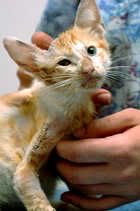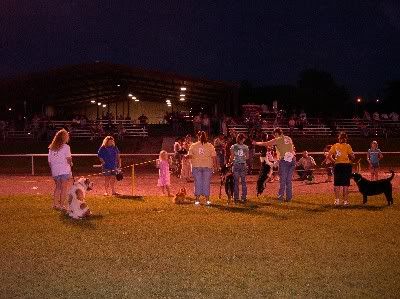
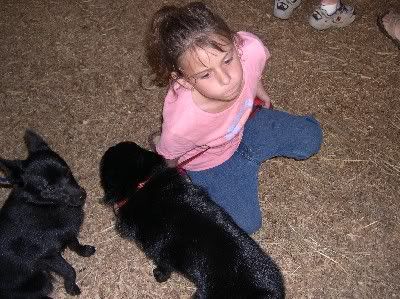
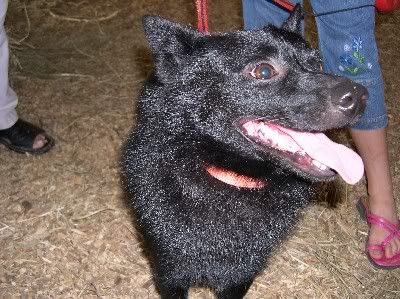
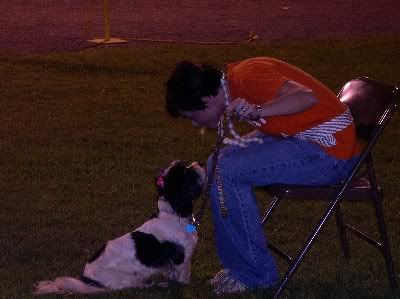




Wrong Place Allegedly intoxicated persons showed up in unusual locations over the weekend, according to Shelbyville police. xxxxx, 46,xxx Road, fell into the salad bar after staggering into Faye's Cafeteria, North Main Street, and attempting to fondle a waitress late Sunday afternoon, police said. xxxxxxx, 21, xxxx Street, was asleep in his car at the Pacific Pride fuel pumps, Depot Street -- where law enforcement officers obtain gasoline for their patrol cars -- when Officer Jerry Lawrence arrested him shortly after 5 a.m. Sunday. xxxx and xxxxx were each charged with public intoxication, Shelbyville police reports indicate.Do you think it's the heat? Nah, I don't think so.
- A visit to the veterinarian for a spring or early summer check-up is a must; add to that a test for heartworm, if your dog isn't on year-round preventive medication. Do parasites bug your animal companions? Ask your doctor to recommend a safe, effective flea and tick control program. - Never leave your pet alone in a vehicle—hyperthermia can be fatal. Even with the windows open, a parked automobile can quickly become a furnace in no time. Parking in the shade offers little protection, as the sun shifts during the day. - Always carry a gallon thermos filled with cold, fresh water when traveling with your pet. - The right time for playtime is in the cool of the early morning or evening, but never after a meal or when the weather is humid. - Street smarts: When the temperature is very high, don’t let your dog standing on hot asphalt. His or her body can heat up quickly, and sensitive paw pads can burn. Keep walks during these times to a minimum. - A day at the beach is a no-no, unless you can guarantee a shaded spot and plenty of fresh water for your companion. Salty dogs should be rinsed off after a dip in the ocean. - Provide fresh water and plenty of shade for animals kept outdoors; a properly constructed doghouse serves best. Bring your dog or cat inside during the heat of the day to rest in a cool part of the house. - Be especially sensitive to older and overweight animals in hot weather. Brachycephalic or snub-nosed dogs such as bulldogs, pugs, Boston terriers, Lhasa apsos and shih tzus, as well as those with heart or lung diseases, should be kept cool in air-conditioned rooms as much as possible. - When walking your dog, steer clear of areas that you suspect have been sprayed with insecticides or other chemicals. And please be alert for coolant or other automotive fluid leaking from your vehicle. Animals are attracted to the sweet taste, and ingesting just a small amount can be fatal. Call your veterinarian or the ASPCA Animal Poison Control Center at (888) 426-4435 if you suspect that your animal has been poisoned. - Good grooming can stave off summer skin problems, especially for dogs with heavy coats. Shaving the hair to a one-inch length—never down to the skin, please, which robs Rover of protection from the sun—helps prevent overheating. Cats should be brushed often. - Do not apply any sunscreen or insect repellent product to your pet that is not labeled specifically for use on animals. Ingestion of sunscreen products can result in drooling, diarrhea, excessive thirst and lethargy. The misuse of insect repellent that contains DEET can lead to neurological problems. - Having a backyard barbecue? Always keep matches, lighter fluid, citronella candles and insect coils out of pets' reach. - Please make sure that there are no open, unscreened windows or doors in your home through which animals can fall or jump.Yesterday, a local news station aired a wonderful piece about pets and hot weather. Simply because of the report, a pet's life was saved. Click HERE to read Heather Orne's after story update. Everybody keep cool out there!
JUST HOW DANGEROUS IS ACETAMINOPHIN TO PETS? No one needs to tell Beth Tucker of Syracuse, NY, how harmful acetaminophen can be to pets. In February 2006, Beth’s cat, Scooter, ingested a 500-milligran acetaminophen tablet that had been accidentally dropped on the floor. Despite treatments by a local veterinarian, the beautiful grey cat did not recover. “She suffered tremendously for five days as we tried to save her,” says Beth. “We finally made the extremely painful decision to end her suffering.” Sadly, Scooter is one of many cats to have succumbed to accidental acetaminophen poisoning. In 2005, the ASPCA Animal Poison Control Center (APCC) handled close to 300 cases from around the country. Explains the APCC’s Dana Farbman, “Depending on the amount ingested, clinical effects can include a condition called methemoglobinemia, which affects blood cells’ ability to carry oxygen to vital organs.” In addition, liver damage and even death could result. And because cats lack a specific enzyme that enables the body to metabolize the drug well, they are especially sensitive to acetaminophen toxicity—although it can be toxic to dogs and other pets, as well. Cautions Farbman, “Pet owners should never give this medication to their animals, and should always store potentially poisonous substances in a secure cabinet above countertop level and out of the reach of pets.” Beth and her family continue to miss Scooter every day. “She was the most loving kitty in the world,” says Beth. “And every evening at 5:00 P.M., if you were anywhere near the kitchen, you could count on Scooter meowing for her nightly treat.” Beth hopes that by sharing Scooter’s experience, she can help others avoid having to go through the anguish she suffered by losing her feline friend. “I feel that telling what happened to Scooter will help make something positive come out of our tremendous loss.” If you think that your pet has accidentally ingested acetaminophen, or any other potentially dangerous substance, call your veterinarian or the ASPCA Animal Poison Control Center's emergency hotline at (888) 426-4435 for round-the-clock telephone assistance. For more pet poison prevention tips, please visit APCC online.Everyone have a GREAT weekend!
Nashville Zoo's new event series, Adventure Socials, brings together festive food, drink and music with unique animals and exotic "locations," right here at Nashville Zoo! The Socials are held on Zoo grounds after hours and since alcohol will be served, the events are only open to adults 21 years of age and older. Purchase tickets now while spots are available! Cost per ticket per event: $25 for Nashville Zoo members, $35 for non-members.I somehow missed the information about this program back when it started, but there are a few really good programs left. Here's the info:
Down Under at Lorikeet Landing Friday, July 14, 2006, 6:30 pm - 8:30 pm Rain Date: Saturday, July 15th G'Day Mate! Taste Australian wines, enjoy great food and visit with colorful parrot friends inside this interactive habitat. Lorikeet Landing provides a lush and naturalistic environment for visitors and flocks of lorikeets to "meet and greet" while enjoying a peaceful summer evening on the Grassmere property. Don't miss the artistic elements of this exhibit's unique and amusing hand washing & drying stations. **Please don't be late, the lorikeets go to bed at 7:30 p.m. Mardi Grassmere at Alligator Cove Friday, August 25, 2006, 6:30 pm - 8:30 pm Rain Date: Saturday, August 26th Rendezvous with our new alligators down in the bayou for Cajun fare and hurricanes. A new habitat opening in 2006, Alligator Cove showcases one of our planet's greatest survivors: the American Alligator. Throw your Mardi Gras beads for this worthy reptile who has endured relatively unchanged for over two million years. Safari Swizzle at the Elephant Savannah Friday, September 15, 2006, 6:30 pm - 8:30 pm Rain Date: Saturday, September 16th African wines and "elephantinis" are running rampant through the Savannah under the stars. Kiba, Hadari and Sukari, Nashville Zoo's elephants, welcome you to their home for some safari fare and a visit with the earth's largest land mammals. Learn about the extensive work that went into creating this spectacular habitat and how it provides a comfortable atmosphere for these gentle giants. I REALLY, REALLY, REALLY want to go to the Safari Swizzle. I think it will be awesome with the elephants. Guess I'd better make my reservation!!
The Reading Education Assistance Dogs® (R.E.A.D.) program improves children’s reading and communication skills by employing a powerful method: reading to a dog. But not just any dog. R.E.A.D. dogs are registered therapy animals who volunteer with their owner/handlers as a team, going to schools, libraries and many other settings as reading companions for children.The are spotlighted in today's Dog Age Tip of the Week. Here's how they explain it:
The R.E.A.D. (Reading Education Assistance Dogs) program pairs specially trained therapy dogs with children who are struggling with reading skills. The dog serves as an audience as the child reads aloud. Dog owners volunteer to take their trained dogs to schools and libraries throughout the U.S. and Canada. Contact your local R.E.A.D. organization to participate, or try this read-aloud approach at home.R.E.A.D's programs are being used across the United States and Canada to improve children's literacy. What a great thing! I definitely want to learn more about this program.

Yesterday, I woke up to my cell phone ringing. It was Casey. His car battery died, so I had to go and rescue him at 6:30 a.m. So, I was up early. By 1:00 p.m. I was so exhausted, that I was down for the count. I had a rather lengthy afternoon nap just to recharge. Casey fixed us a really nice dinner, and afterwards I did all of my weekly cleaning.
Who knows how exciting this weekend will be?
